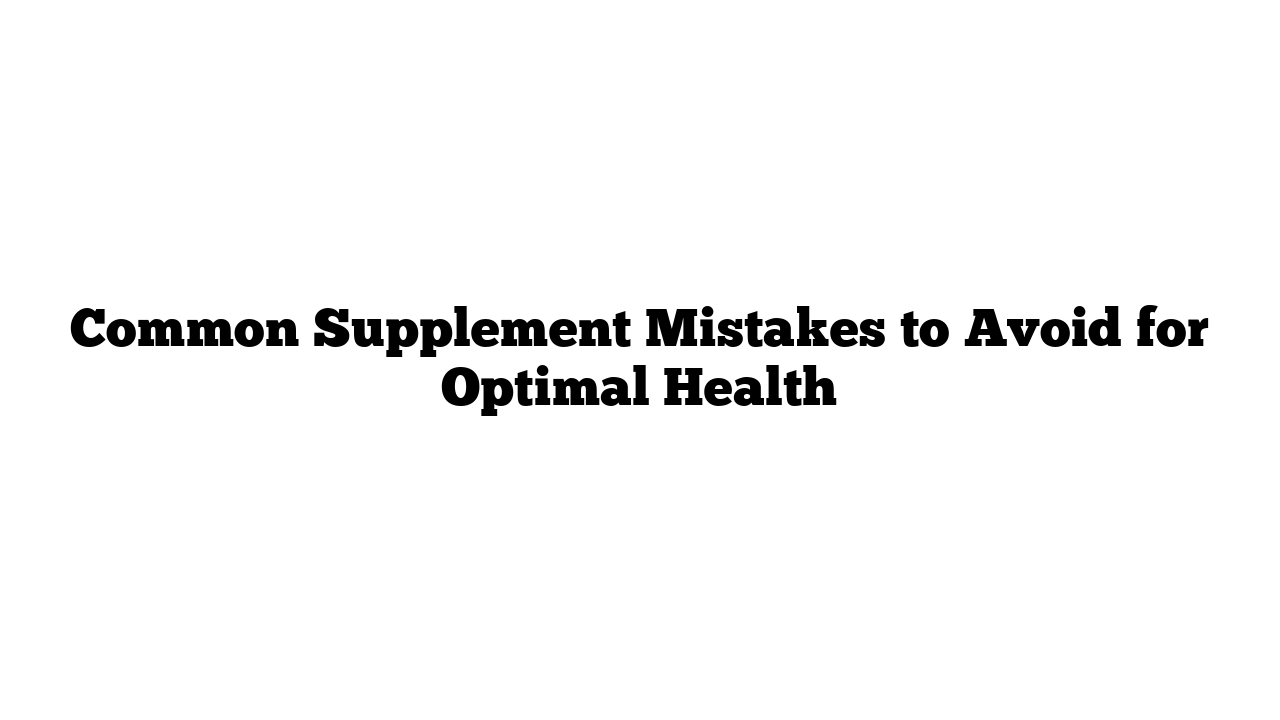Introduction: Are Your Supplements Helping or Hurting?
Taking supplements can be a fantastic way to support your health, but even with good intentions, many people make mistakes that prevent them from getting the benefits they’re looking for. Here, we’ll go over 11 common mistakes people make with supplements, explaining how you can avoid these pitfalls and make the most of your supplement routine.
1. Timing Is Everything: Know When to Take Supplements
Timing matters when it comes to supplements. Many people aren’t sure when they should take their vitamins or minerals, which can affect how well they’re absorbed and utilized. For example, taking Vitamin D in the morning works well for some, but for others, taking it at night may improve sleep. Experimenting with timing can help you find what works best for you. On the other hand, calcium should not be taken immediately before meals as it can neutralize stomach acid and interfere with digestion.
2. Avoid Overloading on Supplements
Taking too many supplements at once can lead to discomfort and even potential health issues. It’s best to introduce supplements gradually, especially if you’re addressing a specific health concern. Adding them one at a time lets you monitor which supplement is providing benefits or causing issues. Taking large doses at once can also be dangerous, so spreading out doses or taking them with meals can help.
3. Supplements Can’t Compensate for Poor Diet
No matter how many vitamins or minerals you take, supplements can’t make up for an unhealthy diet. Diet should be the foundation of good health, with supplements filling in the gaps. For instance, if you consume too many refined carbs, no amount of vitamins will counteract the effects of nutrient depletion and bloating. Start with a balanced diet rich in fruits, vegetables, and proteins, then add supplements as needed.
4. Choosing Quality over Cheap Supplements
Many people choose the cheapest vitamins, not realizing that quality can vary greatly. Low-cost, generic multivitamins may contain fillers, synthetic ingredients, or low-quality forms of nutrients that aren’t easily absorbed by the body. For instance, calcium carbonate, often found in budget multivitamins, is less bioavailable and harder to absorb. Choose high-quality, natural vitamins whenever possible and check the label to avoid unwanted additives.
5. Watch for Drug Interactions
Supplements can sometimes interact with medications, creating adverse effects. For example, if you’re taking blood pressure medication and add magnesium, you may experience a drop in blood pressure that’s too significant. Always consult with your doctor before adding supplements, especially if you’re on medication. This is crucial for medications like antibiotics or blood pressure drugs. For antibiotics, taking a probiotic can help preserve healthy gut bacteria.
6. Understand Vitamin and Mineral Pairings
Certain vitamins and minerals need each other to be effective. Vitamin D, for example, requires magnesium to be properly absorbed, and too much zinc over time can deplete copper levels. Avoid taking high doses of a single mineral for extended periods without the balance of other nutrients. Instead, consider taking mineral complexes or blends to avoid imbalances.
7. Be Wary of Poorly Researched Advice
Everyone has an opinion on supplements, but not all advice is based on solid research. Getting recommendations from reputable sources—like healthcare providers or those with experience in biochemistry—is essential. Avoid advice from unverified sources, as they may lack the in-depth knowledge needed to understand complex interactions between nutrients.
8. Understand Therapeutic Dosing Needs
While the Recommended Dietary Allowances (RDAs) set minimum levels for preventing deficiencies, they may not be sufficient for therapeutic effects. For instance, the RDA for Vitamin D is only about 600 IU, but some individuals benefit from a daily intake closer to 10,000 IU. Vitamin B1 is another example where higher doses may provide benefits beyond what the standard guidelines recommend. Your needs may vary based on genetic factors or specific health conditions, so consider consulting a healthcare provider for personalized dosing.
9. Vegan Diet? Supplement Wisely
Vegans need to be mindful of nutrients commonly found in animal products, such as B12, D3, omega-3 fatty acids, iron, zinc, iodine, and calcium. Without careful planning, a vegan diet can lead to deficiencies in these essential nutrients. Fortunately, many vegan supplements can address these gaps, including omega-3 from algae instead of fish oil.
10. Don’t Skimp on Dosage Frequency for Vitamin D
Vitamin D works best when taken daily or regularly, rather than infrequently. Unlike other vitamins, Vitamin D’s effects last about 24 hours, so taking it daily helps maintain stable levels in the body. For immune support, daily supplementation is essential, especially if you live in a region with limited sun exposure. Aiming for a maintenance dose of around 10,000 IU daily is reasonable, though this can vary based on individual needs.
11. Relying on Outdated Dosage Guidelines
Many current guidelines are based on preventing deficiencies rather than optimizing health. For example, RDAs set decades ago might not reflect modern research on therapeutic levels for health support. If you’re looking to maximize benefits, discuss higher doses with a doctor, especially if you have specific health goals or genetic factors that might influence your needs.
Final Thoughts: Making Supplements Work for You
Taking supplements is not one-size-fits-all. By avoiding these common mistakes and choosing quality products, timing doses appropriately, and consulting professionals, you can make your supplement regimen effective and safe. Supplements are meant to enhance health, not replace a good diet or informed medical advice. For trustworthy health information, visit medicaltimes.io.
